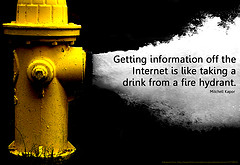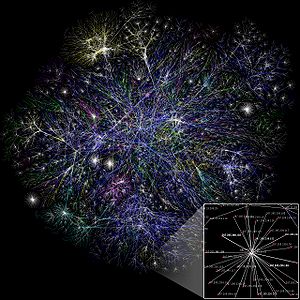Are we at an information abundance and overloading age? How would PLE help us in sorting out and evaluating information throughout the networks? How is knowledge constructed with PLE?
Rita in her Information abundance leads to restricted depth raised many good points:
1. Problems with information abundance and attention economy
2. Changes in thinking process
3. Feasibility of individuals to think critically
4. Importance of reflective judgement
5. Importance of information literacy
6. Advantages of information abundance – a change of our search strategies from looking something up, to incorporating web-searching into thinking and reflection processes in order to enable a fruitful investigation.
7. PLEs that could enhance searches to be relevant to the needs of learners and increase depth of reflection and thinking.
That stimulated me to ask:
1. How far would PLE assist in consolidating the above points for individual learning?
2. “If people do not have access to a robust conceptual framework developed over time with the help of knowledgeable others, they might have problems constructing knowledge.” What sort of robust conceptual framework would be important or ideal in PLE? Would such framework be based on a social constructivist or a connectivist approach, or a combination of them?
3. How would the development of critical literacies impact on PLE?
4. How effective is PLE in solving the information abundance problem as compared to VLE?
5. How would one evaluate a PLE? What are the evaluation criteria of a successful PLE?
Thanks again for making me think.
John


Hi John
nice to see someone do something with my thinking and writing. When you write a PhD thesis (mine was 130.000 words) you weave the words to creates some sort of story and argument. I thought I may as well use some of my thinking to make you all think.
To me information abundance is one of the main challenges in networked learning. There is lots of information out there, there are lots of people out there as well, but human beings are more likely to congregate with people that they feel comfortable with and on a network that they can relate to than to look for the opposite point of view. The challenging function that a teacher performs in a class room, who would show opposing points of view would not be there. There are knowledgeable others out there, but their role is very different from critical teachers. They might choose to, or they might choose not to engage in an argument.
This means that people will have to be fairly autonomous learners with the capacities to analyse critically what they come across.
Of course this has implications for PLEs. How can you make that people are challenged in their beliefs and thinking, but at the same time encouraged to reflect on , and explore and filter information?
Hi Rita,
Thanks for your insights. “Human beings are more likely to congregate with people that they feel comfortable with and on a network that they can relate to than to look for the opposite point of view” Would that be the typical echo chamber effect that are often revealed in the blogosphere and social networks/media? Another concept that may be associated with such congregation may be the “like minds attract” or resonance with the others in the networks as mentioned by Matthias and Jenny here. Here is my view on interference and resonance that affects our learning in networks
I also wonder if appreciative collaborative inquiry could be a way of developing and sustaining the connections and in increasing the connectivity amongst nodes or actors in the networks.
“There are knowledgeable others out there, but their role is very different from critical teachers…. people have to be fairly autonomous learners with the capacities to analyse critically what they come across. ” What would be the roles of these knowledgeable others in the network? In the case of peer learning, what would the roles of the peer learners? How about the roles of the instructors?
How are certain information transmitted, amplified through the networks? I have discussed it here https://suifaijohnmak.wordpress.com/2009/12/21/cck09-memes-and-temes/
How can you make that people are challenged in their beliefs and thinking, but at the same time encouraged to reflect on , and explore and filter information? Do people (even experts and facilitators) feel comfortable when challenged by learners and knowledgeable others? How would that impact on the quality on the discourse or conversation?
John
I have left this comment on Rita’s post:
@Dave, That’s an important insight – on foreign language, especially when one is immersed into an MOOC, where actors of multi-nationals and multi-cultural backgrounds are meeting and interacting in an introductory session, via various media – forums, blogs, twitter, FB etc. Such multi-faceted way of interactions are often fascinating, and may even be overwhelming for many new to the ecology.
May I use a metaphor borrowed from Stephen’s previous discussion/presentation? Learning in a network with different mixes would be like the fruits & vegetables mixing in “salad bowl” (especially in Canada)where ideas and languages are churned, mixed together. Here I would add that jargons are used as a salad dressing and flavour, to accentuate the salads.
In the forums or blogs, you could also find “mixing pot” when small groups of participants are clustering and interacting with each others – like the SL group or the specific language groups that are formed based on the geography or nationality.
This is a typical pattern of network and group formation that was once revealed in CCK08 (especially in the forums & blog community), though not that common in the CCK09 and CritLit2010, due to various reasons.
So, your foreign language analogy is again a re-surfacing of the pattern once people had faced in CCK08.
How would that impact on the economy of attention? Like to hear more from you and others in the MOOC.
As I am researching on MOOC, so would like to see what patterns would emerge from the development of MOOC.
John
Hi John,
I am following your ideas with interest and I appreciate being in your network. This is what I was thinking as I read this post: When a person takes a walk, attends a meeting, or teaches a class, isn’t it possible that the person is flooded with an abundance of information? I know that I take in far more data than I can possibly process. I don’t let the abundance of data paralyze me, I breathe, watch, attend to the way I feel, watch for patterns, take note of some things–and –go with the flow, so to speak. I believe that my brain is processing information on many levels and simultaneously, and there are times I am not even conscious that I saw/experienced something until much later. In the process of living, I see examples of how people organize information, and I am attracted to information that is organized in an aesthetically pleasing and informative manner. In botanical gardens, food, music, movies, blogs and PLEs, and in society, I am drawn to diversity– diversity in nature, human beings, social institutions, and work.
In life and in work, I am not all that concerned with whether or not someone agrees with me. I don’t generally seek out only people who agree with me. It is important to me to be present when others are speaking/writing/learning and to try to see the world through their experience. I am following your ideas concerning network formation with interest, and I appreciate your openness in sharing your ongoing thoughts.
Hi John,
I just found this post. Has it been 10 days already!
As a food lover I found looking at the MOOC as similar to dining at a banquet/buffet/smorgasbord a helpful analogy for dealing with abundance, as I describe here – http://wp.me/p3awX-6U
Hi Sean,
Thanks for sharing. Your analogy for dealing with abundance using a banquet/buffet/smorgasbord with MOOC sounds interesting. I like it.
May I also sharing this https://suifaijohnmak.wordpress.com/2009/03/18/learning-metaphor-our-digestive-system/ on learning metaphor – our digestive system with you? So it would be important to be consider what we learn and how we learn in MOOC by selecting the food that we want in order to keep us healthy. This means identifying, sorting, filtering, curating and absorbing the ideas and information (i.e. the food) that we want, digesting and assimilating them into our system (blood, body and brain – our networks) and sharing with others the nice foods.
John
Hi John,
Ah yes, the digestion system learning metaphor resonates with what I was saying and thinking.
I can see by that post, the rest of your blog and the two papers that you wrote with Jenny Mackness that you have given a lot of thought to how MOOCs work.
How disappointing that some of the issues you raise about the difficulties of running a MOOC don’t seem to have been taken on board by the faciltators.